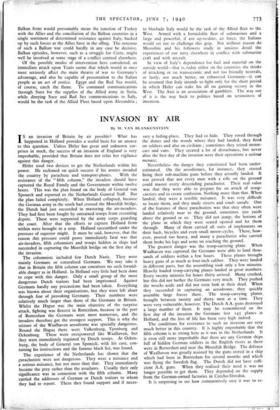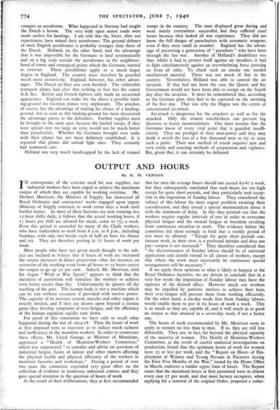IN BY AIR
By M. VAN BLANKENSTEIN
Ts an invasion of Britain by air possible? What has happened in Holland provides a useful basis for an answer to this question. Unless Hitler has great and unknown sur- prises in stock, the success of an invasion of England is very improbable, provided that Britain does not relax her vigilance against this danger.
Hitler used two devices to get the Netherlands within his power. He reckoned on quick success if his armies invaded the country by parachute and transport-planes. With the assistance of the " fifth column," the invaders should have captured the Royal Family and the Government within twelve hours. This was the plan found on the body of General von Sponeck and reported to the Netherlands General Staff. But the plan failed completely. When Holland collapsed, because the German army in the south had crossed the Moerdijk bridge, the Dutch had just succeeded in mastering the air-invaders. They had first been fought by untrained troops from recruiting depots-. These were supported by the army corps guarding the coast. After that the efforts to capture Holland from within were brought to a stop. Holland succumbed under the pressure of superior might. It must be said, however, that the reason this pressure could prove immediately fatal was that air-invaders, fifth columnists and troops hidden in ships had succeeded in capturing the Moerdijk bridge on the first day of the invasion.
The columnists included few Dutch Nazis. They were mainly Germans or naturalised Germans. We may take it that in Britain the fifth column can constitute no such formid- able danger as in Holland. In Holland very little had been done to cope with this danger. Only a small group of the most dangerous Dutch traitors had been imprisoned. Against Germans hardly any precautions had been taken. Everything was known about their organisations, but they were left alone through fear of provoking Germany. Their numbers were relatively much larger than those of the Germans in Britain. Whilst the Hague was the main objective of the surprise attack, fighting was fiercest in Rotterdam, because in the port of Rotterdam the Germans were most numerous, and the invaders therefore got the strongest support. This is why the seizure of the Waalhaven aerodrome was specially dangerous. Round the Hague there were Valkenburg, Ypenburg and Ockenburg. These were overpowered like Waalhaven, but they were immediately regained by Dutch troops. At Ocken- burg, the body of General von Sponeck, with his case, con- taining his instructions and the famous black list, was found.
The experience of the Netherlands has shown that the parachutists were not dangerous. They were a nuisance and a serious nuisance, but not more than that. They immediately became the prey rather than the assailants. Usually their only significance was in connexion with the fifth column. Many carried the addresses of German or Dutch traitors to whom they had to report. There they found support and if neces- sary a hiding-place. They had to hide. They roved through the dunes and the woods where they had landed, they fired on soldiers and also on civilians ; sometimes they seized motor- cars and vans. They created a lot of disturbance, but never after the first day of the invasion were their operations a serious menace.
Nevertheless the danger they constituted had been under- estimated. On the aerodromes, for instance, they started firing their sub-machine guns before they actually landed. It was proved that not every man with a rifle on the ground could master every descending parachutist. Their real value was that they were able to prepare for an attack of troop- carriers and to create confusion. Nothing more than that. When landed, they were a terrible nuisance. It was very difficult to locate them, and they made streets and roads unsafe. One of the features of these parachutists was that they often were landed relatively near to the ground, sometimes 50o yards above the ground or so. They did not jump; the bottom of the plane in which they were seated opened and let them through. Many of them carried all sorts of implements on their back, bicycles and even small motor-cycles. These, how- ever, proved too heavy, and many a parachutist who carried them broke his legs and aims on reaching the ground.
The greatest danger was the troop-carrying plane. When Waalhaven was captured the Germans were able to land thou- sands of soldiers within a few hours. These planes brought heavy guns of as much as four-inch calibre. They were landed in different parts, but the assembling took only a few minutes. Heavily loaded troop-carrying planes landed in great numbers. Every twenty minutes for hours thirty arrived. Many crashed, but this did not bother the Germans very much. They pushed the wrecks aside and did not even look at their dead. When they succeeded in capturing an aerodrome, they quickly assemble large forces there. The troop-carrying planes, brought between twenty and thirty men at a time. They were very vulnerable, however. The Dutch A.A. guns destroyed a large number of them. It may be remembered on the first day of the invasion the Germans lost 543 planes in Holland, and the loss of life has been very high indeed.
The conditions for resistance to such an invasion are very much better in this country. It is highly improbable that the fifth column is as strong here as it was in the Netherlands. It is even still more improbable that there are any German ships full of hidden German soldiers in the English rivers as there were in Rotterdam and near the Moerdijk Bridge. The defence of Waalhaven was greatly assisted by the guns stored in a ship which had been in Rotterdam for several months and which was flying the Swedish flag. The Dutch did not have suffi- cient A.A. guns. When they realised their need it was no longer possible to get them. They depended on the supply from the German-owned factories in Czecho-Slovakia.
It is surprising to see how comparatively easy it was to re- conquer an aerodrome. What happened in Norway had taught the Dutch a lesson. The very wide open motor roads were made useless for landings. I am told that the Swiss, after our experiences, have mined their aerodromes. The ground defence of most English aerodromes is probably stronger than those of the Dutch. Holland, on the other hand, had the advantage that it was impossible for the Germans to land systematically and on a big scale outside the aerodromes in the neighbour- hood of towns and strategical points which the Germans wanted to overrun. These possibilities apply to a much larger degree in England. The country must therefore be guarded much more extensively. England, however, has other advan- tages. The Dutch air-fleet was soon finished. The vulnerable transport planes had after that nothing to fear but the scanty A.A. fire. British and French fighters only made an occasional appearance. England can make the sky above a possible land- ing-ground for German planes very unpleasant. The attacker, of course, has the advantage of making his choice of a landing- ground, but as soon as this landing-ground has been discovered the advantage passes to the defenders. Further supplies must be brought to the same spot, because the landed troops, if they were spread over too large an area, would not be much better than parachutists. Whether the Germans brought over tanks with their planes has not been definitely established. It is reported that planes did unload light ones. They certainly had armoured cars.
Holland was very much handicapped by the lack of trained troops in the country. ' The men displayed great daring and were nearly everywhere successful, but they suffered cruel losses because they lacked all war experience. They did not know the full danger of parachutists with automatic weapons, even if they were small in number. England has the advan- tage of possessing a generation of " parashots " who have been through the last war. Another of Holland's disabilities was that, whilst it had to protect itself against air invaders, it had to fight simultaneously against an overwhelming force pressing on from all sides. To check such an enemy one needed mechanised material. There was not much of that in the country. Nevertheless, Holland was able to control the air invasion. If that had not been the case the Queen and her Government would not have been able to escape on the fourth day after the invasion. It must be remembered that, according to the German plan, they had to be captured on the morning of the first day. That was why the Hague was the centre of concentrated air-attack.
Air-attack is dangerous for the attackers as well as for the attacked. Only the utmost watchfulness can prevent big disasters or heavy inconveniences. One must assume that the Germans know of every vital point that is guarded insuffi- ciently. They are prodigal of their man-power and they may think it worth the loss of a few thousand men to try to seize such a point. Their new method of attack requires new and very costly and exacting methods of preparation and vigilance. But, given that, it can certainly be defeated.



































 Previous page
Previous page